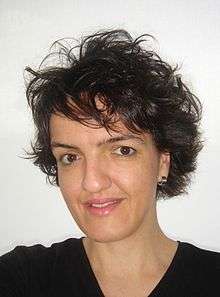Silvia Arber
Silvia Arber (born 1968 in Geneva) is a Swiss neurobiologist.[2] She teaches and researches at both the Biozentrum of the University of Basel and the Friedrich Miescher Institute for Biomedical Research in Basel Switzerland.
Silvia Arber | |
|---|---|
 | |
| Born | 1968 Geneva |
| Nationality | Swiss |
| Awards | Louis-Jeantet Prize for Medicine (2017)[1] |
| Scientific career | |
| Fields | Neurobiologist |
| Institutions | Columbia University, Friedrich Miescher Institute, Biozentrum University of Basel |
Life
Silvia Arber studied biology at the Biozentrum of the University of Basel and completed her doctorate in 1995 at the Friedrich Miescher Institute (FMI) in Basel. She subsequently worked as a postdoctoral fellow at the Columbia University in New York. In 2000, Silvia Arber returned to Basel as a Professor of Neurobiology/Cell Biology continuing her research work and teaching at the Biozentrum as well as at the FMI. Silvia Arber is the daughter of the Swiss microbiologist and geneticist Werner Arber, who in 1978 was awarded the Nobel Prize for Physiology or Medicine.[3]
Work
Silvia Arber investigates the mechanisms involved in the function and assembly of neuronal circuits controlling motor behavior. She has shown that premotor interneuron groups differ from each other in their functionality and distribution in the spinal cord and that this property depends on the timing of their generation during development.[4]
Awards & Honors
- 1998: Pfizer Forschungspreis[6]
- 2003: National Latsis Prize[7]
- 2005: elected Member of the European Molecular Biology Organization (EMBO)[8]
- 2005 Schellenberg Prize[9]
- 2008 Friedrich Miescher Award[10]
- 2009 ERC Advanced Investigators Grant[11]
- 2014 Otto Naegeli Prize[12]
- 2014: elected Member of the Academia Europaea[13]
- 2017: Louis-Jeantet Prize for Medicine [14]
- 2018: Pradel Research Award
References
- Louis-Jeantet Prize
- Biography
- Curriculium Vitae
- Research Group
- https://www.cell.com/cell/editorial-board
- Pfizer Forschungspreis Archived 2006-05-24 at the Wayback Machine
- National Latsis Prize Archived 2013-10-29 at the Wayback Machine
- Elected Member of the European Molecular Biology Organization (EMBO)
- Schellenberg Prize
- Friedrich Miescher Award
- ERC Advanced Investigators Grant
- Silvia Arber receives Otto Naegeli Prize 2014 Retrieved 2014-03-26.
- Elected Member of the Academia Europaea ae-info.org. Retrieved 2014-9-04
- Louis-Jeantet Prize 2017